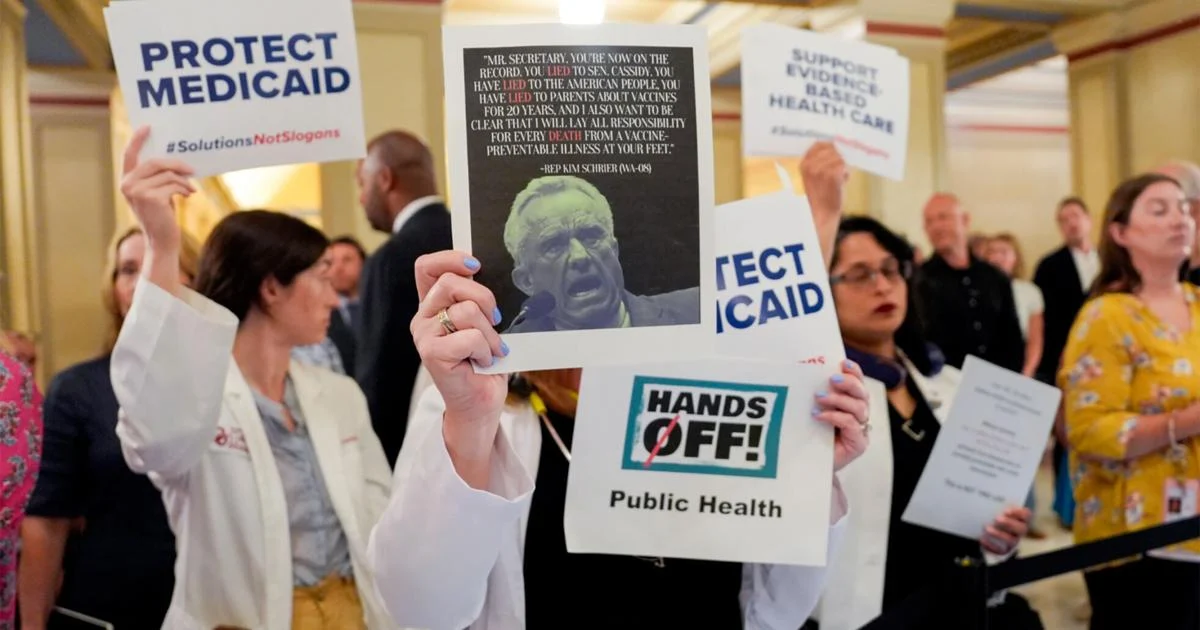
Steve Metzer
Tulsa World Capitol Bureau Staff Writer
Get email notifications on {{subject}} daily!
Your notification has been saved.
There was a problem saving your notification.
{{description}}
Email notifications are only sent once a day, and only if there are new matching items.
Followed notifications
Please log in to use this feature
Log In
Don’t have an account? Sign Up Today
OKLAHOMA CITY — Children are more likely to live in poverty in Oklahoma than they are in 41 other states, and trends in federal policy may make their lives even harder in coming years, the executive director of the Oklahoma Institute for Child Advocacy fears.
Joe Dorman, who recently marked his ninth anniversary as the OICA director, said actions taken by the federal government to give states more responsibility for funding Medicaid and other social safety net programs will likely put more strain on Oklahomans.
Many are struggling already.
Citing data from the U.S. Census Bureau’s 2024 American Community Survey, the Oklahoma Policy Institute reported recently that, despite some progress, the Sooner State still ranked eighth in the nation in overall poverty and ninth in childhood poverty. While the state’s overall poverty rate declined by about 1% from 2023, about 14.9% of its people — 1 in 7 — still were living in poverty in 2024. That compared to a national rate of 12.1%
Last year in Oklahoma, 18.9% of children — nearly 1 in 5 — lived below the federal poverty line. For a family of three, that was defined as living in a household that had total annual earnings of less than $25,249.
An even greater percentage of children in the state, about 25%, live with food insecurity.
Dorman said leaders in Oklahoma should be planning now for how the state will deal with the federal changes.
“A lot ties back into government support for programs that help people in a very difficult time to get back on their feet,” he said. “We’re going to see some of those scaled back or eliminated over the next couple of years, so we have to be very watchful and very careful.”
Referencing Congressional Budget Office estimates, the Center on Budget and Policy Priorities reported that approximately 15 million Americans are expected to lose health care coverage by 2034 as a result of revisions made to the Affordable Care Act and federal cuts to Medicaid funding. Provisions in the recently passed One Big Beautiful Bill also will result in diminished federal funding for SNAP, the nation’s largest food assistance program. Cuts also are expected to impact support for affordable housing, rural hospitals, student loan programs and more, beginning in 2026.
About 25% of Oklahomans — more than 1 million people — are currently enrolled in SoonerCare, the state’s Medicaid program. More than 700,000 rely on SNAP to help stretch their grocery budgets.
Dorman noted that Oklahomans passed a state question in 2020 to adopt Medicaid expansion as a constitutional amendment, which will obligate the state to pay program bills even if federal funding declines.
State lawmakers grappling with that also will have to decide how — or even if — they will continue programs that previously have depended on American Rescue Plan Act funding, which has now expired. Dorman said some of the recent progress made in reducing poverty may be attributed to ARPA dollars.
“A lot of organizations all across the spectrum see what the potential could be, and we don’t want to lose those little bits of gain that we’ve made,” he said.
He said he has met with lawmakers from both the Republican and Democratic parties who are concerned about how the state will respond. Oklahoma currently has record savings socked away, but last year’s elimination of the state’s tax on groceries and this year’s income tax cut combined with any new spending obligations may put serious strain on finances in coming years.
“We have a lot of lawmakers who work on appropriations that are sweating over these numbers, and they are going to be forced to make cuts, because I certainly don’t have any faith that we are going to see a tax increase in Oklahoma,” Dorman said.
Some may feel that Oklahomans would come out ahead in the long run if programs to address poverty might simply be eliminated.
“That’s always been an argument politically that has certainly grown stronger, and with President Trump, they have someone who has actually carried forward with it,” Dorman said. “Many Republican presidents have said that, but none have gone to this level of seeing it through.”
The OICA director said he’s hopeful that leaders in Washington will work to ensure that reforms are enacted sensibly. He credited U.S. Sen. James Lankford, R-Oklahoma, for helping to restore a tax credit that people can claim on donations made to nonprofits even if they don’t itemize.
“That’s how it used to be, but it was changed in 2017 and cost about $20 billion to the nonprofit sector,” he said. “The Oklahoma Center for Nonprofits worked with (Lankford) in getting that back. So, with things like that, at least some lawmakers are recognizing there are problems that need to be addressed.”
At the state level, he suggested that lawmakers might consider increasing the child care/child tax credit to provide greater assistance to low-income families. Oklahomans who work two or even three part-time jobs to make ends meet would benefit from an increase in the minimum wage. Dorman said the OICA also has advocated for action to open the Insure Oklahoma program up to more people.
“We are fortunate that we have a lot of great lawmakers on both sides of the aisle in both chambers who care about kids. They may have a different pathway to get to a solution, but they at least, through the nine years that I have been here, have been willing to sit down and listen and look at data,” Dorman said. “An investment in one area can help you to save money in other areas, and we need those lawmakers that can look at the big picture and figure out what’s going to be the best for everyone.”
steve.metzer@tulsaworld.com
Get Government & Politics updates in your inbox!
Stay up-to-date on the latest in local and national government and political topics with our newsletter.
* I understand and agree that registration on or use of this site constitutes agreement to its user agreement and privacy policy.
Steve Metzer
Tulsa World Capitol Bureau Staff Writer
Get email notifications on {{subject}} daily!
Your notification has been saved.
There was a problem saving your notification.
{{description}}
Email notifications are only sent once a day, and only if there are new matching items.
Followed notifications
Please log in to use this feature
Log In
Don’t have an account? Sign Up Today



